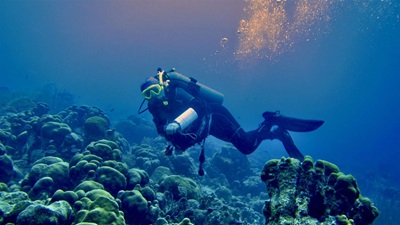Science-Based Solutions Help Bonaire's Coral Reefs Thrive
How a decades-long research collaboration between local managers and Pew marine fellows strengthened reef resilience on the Caribbean island

For decades, Bonaire has been home to some of the Caribbean’s healthiest coral reefs. The island often avoids damage from heavy storms that typically form to the north and ravage marine habitats throughout the region, but Bonaire’s unusual reef health is most likely due to a human factor: its long history of strong science-based management practices.
Many of these reef-bolstering practices began when marine scientists, researchers from a range of disciplines, and local reef stewards met at the 2002 annual meeting of The Pew Charitable Trusts’ Fellows Program in Marine Conservation, which was held in Bonaire. There, they exchanged information, ideas, best practices, and insights that would solidify relationships among Bonaire’s natural resource managers and marine experts—a key development in the reefs’ health.
Following the meeting, 1998 Pew marine fellow and professor at the University of Maine Robert Steneck and 1996 fellow Tim McClanahan proposed working with Bonaire's natural resource managers to determine the health of the island's reefs and develop a monitoring protocol. Since then, Steneck has returned to the island every other year, accompanied by his students and fellow researchers, to monitor Bonaire's coral reefs at specific locations of interest.
Where science meets stewardship
Starting in 2003, Steneck and his teams of colleagues and students began to research Bonaire’s reefs and on one reef animal in particular—the parrotfish. These fish are important to coral ecosystems because, like other herbivorous fish, they eat large amounts of algae that can smother corals and compete with coral larvae for habitat on the reef.
“Our research determined that parrotfish were unusually abundant. This was a breakthrough,” Steneck said. “We had identified Bonaire’s unique banning of spearfishing in 1971 to have been surprisingly successful in maintaining healthy reefs. Because parrotfish are poor swimmers and easily speared, once spearfishing was banned, their numbers increased and the harmful algae they eat became rare.”
The findings prompted local managers to enact laws in 2010 that strengthened protections for the animals by banning parrotfish fishing and phasing out the use of traps that catch and kill them. Today, catching parrotfish is still banned on coral reefs within Bonaire National Marine Park, which contains all of the country’s coral reefs.
The decades-long research collaboration has also helped Bonaire’s reefs maintain a higher percentage of hard coral cover—a key indicator of reef health—than many other islands in the region. For example, Bonaire has an actively managed network of “no-take” marine preserves—highly protected areas that prohibit the removal or destruction of natural or cultural resources. The country has also prohibited boats from dropping anchor within the park and requires divers to take orientation courses to learn about the park's regulations and about responsible diving practices.
The value of collaboration
These policies and other conservation-oriented reforms were possible because of the strong partnerships between researchers and local managers, said Steneck.
“Working collaboratively from day one, as we did, starting at the 2002 Pew fellows meeting, is much more helpful to local efforts,” Steneck said. “It is better for the local managers to advance the conservation measures than for scientists like me to want to put our own stamp on it. Foreign conservation groups who want to tell locals how to manage their ecosystem have a long track record of failure.”
Working with locals also featured prominently in Steneck’s collaboration with other Pew marine fellows, including 2010 fellowship recipient Peter Mumby, a professor at the University of Queensland in Australia. Steneck and Mumby wanted to understand why, in the face of climate impacts, Bonaire’s reefs have fared better than those of other Caribbean islands. In 2019, the scientists published a study highlighting the importance of Bonaire’s local management measures—such as the ban on parrotfish fishing—that helped the island’s reefs bounce back from coral bleaching-induced mass mortality following a 2010 marine heat wave.
“[T]here is much to learn from the management successes of Bonaire’s coral reefs. They demonstrate that local management today can contribute to the recovery resilience of this endangered ecosystem,” Steneck, Mumby, and their co-authors wrote in their study.
Bolstering resilience for an uncertain future
But even Bonaire’s exceptionally effective management measures have limits.
Intensifying climate effects are now putting the island’s protections to the test. A 2024 article in Vox explored current pressures, including rising ocean temperatures, that can stress corals and cause them to expel the symbiotic algae in their tissues that provide their primary source of food and color. As a result, corals can turn white, a phenomenon known as bleaching, and become highly susceptible to disease. In addition, an aggressive coral condition, known as stony coral tissue loss disease, poses an unprecedented threat to the island’s coral-dominated ecosystems.
“All reefs, especially those in the Caribbean, are in trouble and have seen considerable mortality,” Steneck said. “Climate-induced bleaching is serious but so are the waves of coral diseases that have swept through the Caribbean since the 1980s. This is why I’ve focused on ‘recovery resilience.’”
Resilience has two components: resisting a disturbance and recovering from one, Steneck said. Reefs do not have the ability to resist acute ocean warming that results in lethal bleaching or to resist a hurricane. They also may not be able to resist a deadly disease. “But they can recover relatively rapidly if properly managed,” Steneck said.
A crucial aspect of successful recovery also involves fostering a deeper awareness about the human role in protecting coral reefs. “The public often does not understand the link between reef fish and reef health,” Steneck said. “Tourists come to see great coral reefs but then order reef fish at the restaurants. I’d love to see that stop.”
Nathan Fedrizzi works on the Pew Fellows Program in Marine Conservation.









